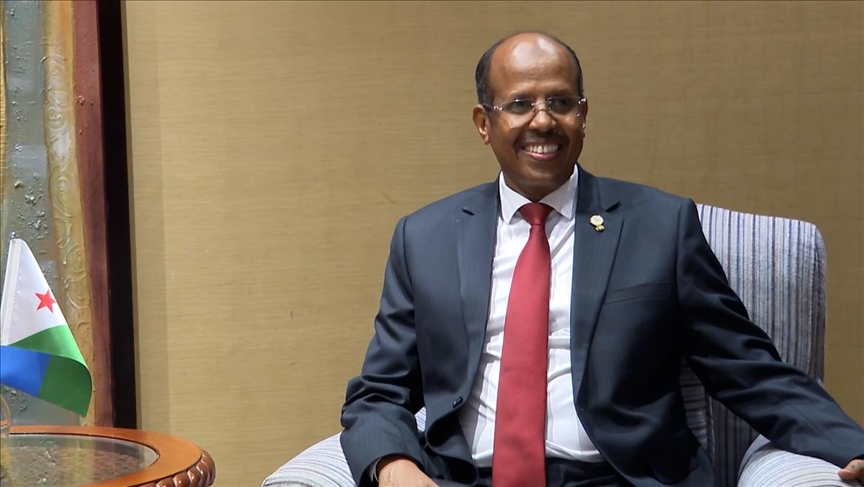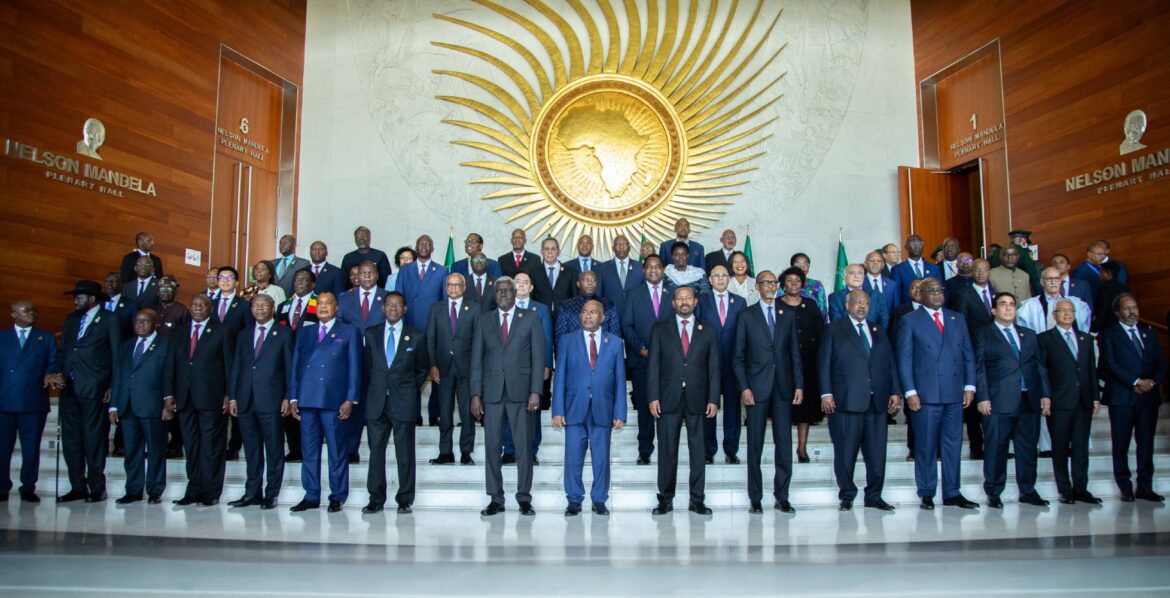An Open Letter to African Heads of State, the African Union, and Regional Economic Communities (EAC, SADC, ECOWAS, and Others): A Passionate Appeal for Unity and Liberation from Colonial Shackles
Esteemed Heads of State, Esteemed Leaders of the African Union, Honorable Representatives of the East African Community (EAC), Southern African Development Community (SADC), Economic Community of West African States (ECOWAS), and other Regional Economic Communities,
We, the people of Africa, united in our shared vision for a prosperous selfreliant continent, address you with hearts full of hope and minds sharpened by urgency.
We rallied behind Mahmoud Ali, propelling him to victory in the Africa Union Chairmanship elections, believing in his commitment to our collective aspirations. Yet, we cannot stand idly by as symbolic gestures overshadow the urgent need for tangible transformative change.

The Chairman of the African Union Mahmoud Ali-Youssouf
Our continent remains bound by self-induced challenges, rooted in colonial legacies that infiltrate our governance systems, favoring Western interests over African unity, products, prosperity.
This letter is a passionate appeal to your logic and conscience, urging you to break these chains and forge a path toward a united Africa, guided by the PanAfricanist dream of self-determination and shared destiny.
The issues we face, expensive intra-African travel, restricted mobility, trade dependency, telecommunications inequities, financial exclusion, stalled infrastructure, linguistic fragmentation, external interference are interconnected threads of a colonial web designed to keep us divided and impoverished.
These are not mere inconveniences; they are deliberate barriers that make us strangers in our own home, fostering distrust among ourselves while elevating foreign systems as false gods. Let us connect the dots, supported by evidence, and awaken our collective conscience to act decisively for Africa’s liberation.
The High Cost of Disunity: Intra-African Air Travel
Why does it cost more to fly from Nairobi to Lagos than to London, Amsterdam, or Dubai? A oneway flight from Nairobi to Lagos, approximately 4700 km, costs around $430, while a 6800 km flight to London can be as low as $299. High airport taxes – $50 per passenger in Africa compared to $30.25 in Europe – limited competition, poor infrastructure, with only 34% of sub-Saharan airports having paved runways, drive these costs.
Africa accounts for less than 2% of global air traffic despite 18% of the world’s population. Protectionist policies, often rooted in colonial-era agreements, favor foreign carriers, hindering regional integration.
We appeal to your logic: why should Africans pay more to visit their neighbors than to travel to former colonial capitals? Let us liberalize our skies, reduce taxes, enforce the 2000 airspace agreement to foster connectivity and unity.
Barriers to Mobility: The Visa Trap
Why do we cling to outdated visa systems when most African countries lack embassies in their neighbors? Only 22% of intraAfrican travel is visa free, compared to higher rates globally. Bureaucratic inertia, security concerns, limited technological infrastructure perpetuate this fragmentation. While Rwanda and Kenya lead with visa free policies despite their hollow implementation strategies, many nations lag, echoing colonial strategies to divide us. A digital visa system could transform mobility, boosting trade and cultural exchange.
We beseech you: dismantle these barriers and embrace digital visas by 2026 to make Africa a home without borders for its people.
Importing Dependency: Milk and Water from France
Why do we import over $2 billion in dairy from France in 2022 when Kenya and Uganda have abundant production? EU subsidies make imported milk cheaper, undermining local farmers. Only 16.6% of Africa’s trade is intracontinental, compared to 35 to 40% in East Asia. Historical trade ties and non-tariff barriers, rooted in colonial agreements, favor Western products. The African Continental Free Trade Area (AfCFTA) offers hope, yet progress is slow.
We implore you: prioritize intraAfrican trade, dismantle barriers, fully operationalize AfCFTA by 2027 to empower our producers and break the cycle of dependency.
Telecommunications Inequity: The Roaming Racket
Why do Africans pay $5 to $10 per MB for roaming data while foreigners pay under $0.50 per MB? Africans often buy new SIM cards per country, disrupting connectivity, while foreigners roam seamlessly due to favorable global agreements. Lack of regional telecom integration and colonialera divides, with traffic transiting through Western hubs, inflate costs.
We appeal to your conscience: why should Africans be penalized for crossing their own continent? Standardize roaming rates and enforce regional agreements by mid-2026 to ensure equity and connectivity.
Financial Exclusion: Money Transfer Barriers
Why can Americans and Europeans send money to African mobile numbers, yet Africans face high fees (up to 9%) to send abroad? Services exist, but regulatory barriers and infrastructure gaps limit reciprocity. IntraAfrican transfers, costing over 9%, and crossnetwork transfers within countries, hindered by competition and lack of APIs, reflect colonial economic structures.
We urge you: enable seamless affordable transfers by 2026, leveraging mobile money to foster financial inclusion.
Stalled Dreams: TransAfrican Highways
The Mombasa-Senegal and Cape-to-Cairo highways, part of the Trans African Highway network, remain incomplete, with 51% unconstructed as of 2024. Funding shortages and conflicts in Sudan and the Sahel, costing 50 to 175% more than global transport averages, stall progress. Are these conflicts, often fueled by external powers, designed to keep Africa fragmented?
We call on you: secure funding, deploy AU-led peacekeeping, complete these highways by 2030 to connect our people and economies.
The Language of Unity: Swahili’s Promise
Why is Swahili, spoken by over 200 million, not a mandatory subject in our schools? Linguistic diversity and colonial legacies favoring English, French, Portuguese prevail. Yet, Swahili’s adoption by the AU and Tanzania’s education system shows its unifying potential.
We entreat you: mandate Swahili in schools by 2030 to foster cultural pride and PanAfrican unity.
External Overreach: The UNDP’s Role
Why does the United Nations Development Program (UNDP), supporting 46 African countries, demand to address the AU General Assembly, overshadowing African-led initiatives? This influence, rooted in colonial power dynamics, undermines our sovereignty.
We respectfully request: limit UNDP to advisory roles and prioritize AU-led programs by 2025 to assert our independence.
A Pan-Africanist Call to Action
These challenges are not isolated; they are symptoms of a colonial legacy we have yet to fully dismantle. We are trapped in a rut of poverty, made to distrust each other while venerating foreign systems and leaders who fail to deliver.
Our governance, infiltrated by Western interests, prioritizes their prosperity over ours. Yet, we are the heirs of Nkrumah, Nyerere, Sankara, whose Pan-Africanist vision demands unity, self-reliance, pride.
We respectfully propose the following actions:
- Liberalize Air Travel: Reduce airport taxes and enforce the 2000 airspace agreement by 2026 to lower intraAfrican flight costs.
- Adopt Digital Visas: Implement digital visa systems across AU member states by 2026 to enhance mobility.
- Boost IntraAfrican Trade: Dismantle trade barriers and operationalize AfCFTA by 2027 to prioritize local products.
- Standardize Roaming Rates: Ensure Africans pay no more than foreigners for roaming by mid2026.
- Enhance Financial Inclusion: Enable affordable intraAfrican and cross-network transfers by 2026.
- Complete TransAfrican Highways: Secure funding and address conflicts to finish key routes by 2030.
- Mandate Swahili: Integrate Swahili as a compulsory subject in schools by 2030.
- Assert Sovereignty: Limit UNDP’s role to advisory by 2025, prioritizing AU-led initiatives.
Esteemed leaders, the time for excuses has passed. The conversations may be open, but Africa remains closed to itself. Let us reject division, dependency, external dominance.
With the spirit of PanAfricanism, let us build a continent where our skies, borders, markets, voices are truly ours. Act now, and let history remember you as the architects of a united prosperous Africa.
In solidarity and hope,
The Voice of Africa’s People
Francis Gaitho.

